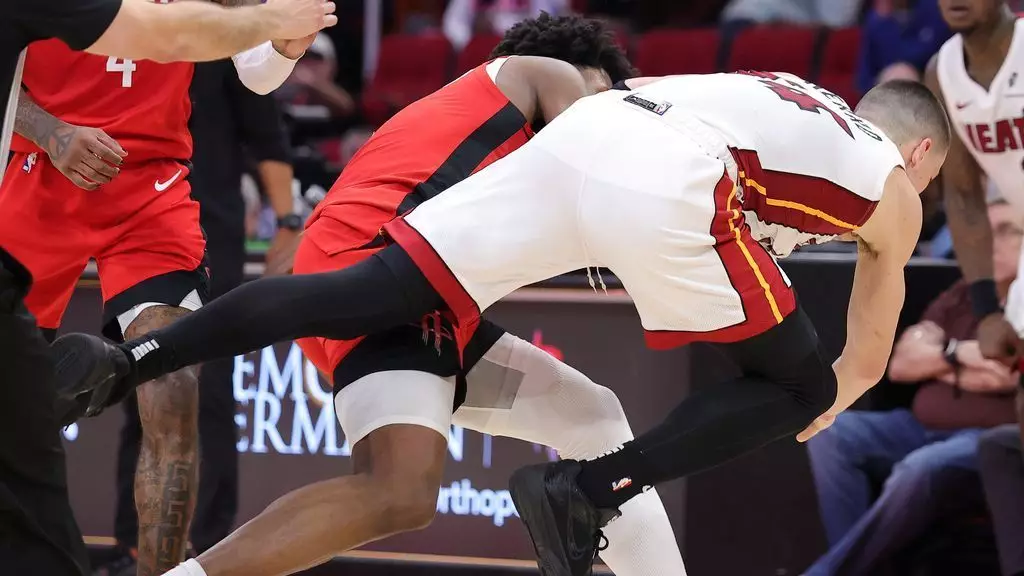Intense Rivalries: Analyzing the Heat’s Victory Amidst Controversy
There’s something undeniably captivating about a basketball game that stirs up emotions and leaves fans on the edge of their seats. That was exactly the scene in Houston when the Miami Heat narrowly clinched a 104-100 victory over the Rockets. It was an evening filled with not just athletic brilliance but also a fiery altercation that seemed to define the night. The tension was palpable, and as the final minutes ticked away, it was evident that this wasn’t just another game; it was a testament to the fierce rivalries that fuel the NBA.
The incident that lit the fuse occurred during an inbound play when Rockets forward Amen Thompson engaged Heat guard Tyler Herro in a way that quickly escalated. Thompson’s aggressive move, described by officials as a “body slam,” sparked immediate conflict and stirred up questions about sportsmanship. Such moments in sports often reveal the fine line between competitive spirit and unsportsmanlike conduct. Although both players showed competitive fire, this altercation underlined the risks involved when emotions run high on the court.
This scuffle didn’t just stop with Herro and Thompson. It snowballed into a larger spectacle resulting in six ejections, including players and coaching staff from both sides. The ejections of guards Terry Rozier and Jalen Green, along with Rockets assistant coach Ben Sullivan for unsportsmanlike comments, further amplified the emotional intensity of the night. The aftermath left both teams needing to reassess their dynamics as they prepared for upcoming games without key contributors.

Even without their star player Jimmy Butler, who missed his fifth consecutive game, the Heat showcased impressive resilience against Houston’s young team. Overcoming a 12-point deficit, Miami’s determination shone through as they adapted to maintain their competitiveness. Herro’s reflection on facing one of the Western Conference’s stronger teams indicates not only respect for opponents but also highlights how rivalries can foster healthy competition beyond immediate confrontations.
Key Takeaways
- The Miami Heat secured a narrow 104-100 victory over the Houston Rockets amidst intense rivalry.
- A significant altercation led to multiple ejections, highlighting sportsmanship issues.
- The Heat demonstrated resilience despite missing their star player, Jimmy Butler.
A Game Defined by More Than Just Points
In any high-stakes game like this one, it’s often more than just points and plays that make headlines—it’s also about how players handle pressure and emotion. The confrontation between Herro and Thompson was an explosive epitome of what happens when competitive spirits clash under intense circumstances. Such incidents serve as reminders of how crucial it is for athletes to balance their drive to win with maintaining composure on the court.
The involvement of additional players and coaching staff only intensified the emotional atmosphere of the game. While these ejections inevitably impacted team strategies moving forward, they also opened discussions about accountability and discipline within professional sports. For fans and analysts alike, such dramatic moments add layers to how we view rivalry games—where emotions are as much a part of the narrative as any scoreboard tally.
Lessons Learned from On-Court Altercations
As thrilling as it is to witness raw emotion in sports, it’s equally important to learn from such instances. Both teams now face the challenge of channeling their competitive energy toward productive ends rather than letting aggression overshadow skillful play. Reflecting on these events can be pivotal for team growth, ensuring future encounters are fought with tenacity but also mutual respect.
- Review and understand what led to heightened tensions during gameplay.
- Emphasize sportsmanship in team practices and meetings.
- Develop strategies to maintain composure under pressure.
- Encourage open dialogue among players about handling rivalries constructively.
Final Thoughts
This particular game between the Heat and Rockets serves as a vivid reminder of both the beauty and complexity inherent within professional basketball. It’s a sport where skill meets strategy, but also where human emotion can tip the scales dramatically. As both teams move beyond this clash, they carry forward lessons that will undoubtedly shape future performances on the court. Ultimately, while rivalries add excitement to any season, maintaining respect amidst competition is what truly defines champions.
Miami Heat
Houston Rockets
NBA Rivalries
Sportsmanship
Basketball Controversy


Leave a Reply